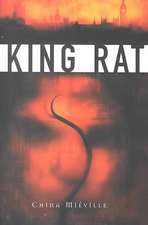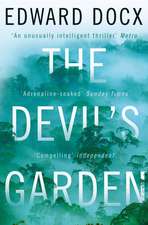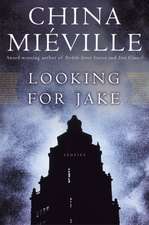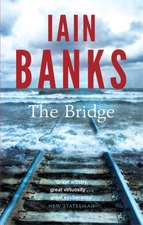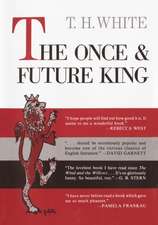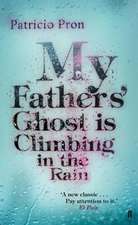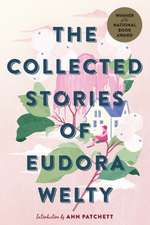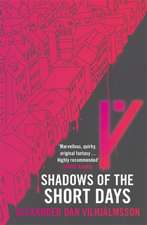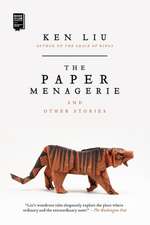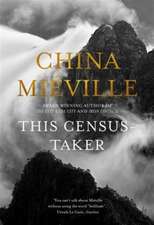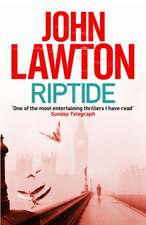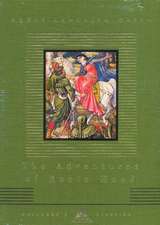Kraken
Autor China Mievilleen Limba Engleză Paperback – 6 mai 2011
| Toate formatele și edițiile | Preț | Express |
|---|---|---|
| Paperback (2) | 34.28 lei 3-5 săpt. | +44.00 lei 6-12 zile |
| Pan Macmillan – 6 mai 2011 | 34.28 lei 3-5 săpt. | +44.00 lei 6-12 zile |
| Del Rey Books – 28 feb 2011 | 110.10 lei 3-5 săpt. |
Preț: 34.28 lei
Preț vechi: 71.07 lei
-52% Nou
Puncte Express: 51
Preț estimativ în valută:
6.56€ • 6.85$ • 5.43£
6.56€ • 6.85$ • 5.43£
Carte disponibilă
Livrare economică 14-28 martie
Livrare express 27 februarie-05 martie pentru 53.99 lei
Preluare comenzi: 021 569.72.76
Specificații
ISBN-13: 9780330492324
ISBN-10: 0330492322
Pagini: 481
Dimensiuni: 129 x 192 x 34 mm
Greutate: 0.35 kg
Editura: Pan Macmillan
Colecția Tor Books
Locul publicării:United Kingdom
ISBN-10: 0330492322
Pagini: 481
Dimensiuni: 129 x 192 x 34 mm
Greutate: 0.35 kg
Editura: Pan Macmillan
Colecția Tor Books
Locul publicării:United Kingdom
Notă biografică
China Miéville lives and works in London. He is three-time winner of the prestigious Arthur C. Clarke Award (Perdido Street Station, Iron Council and The City & The City) and has also won the British Fantasy Award twice (Perdido Street Station and The Scar). The City & The City, an existential thriller, was published to dazzling critical acclaim and drew comparison with the works of Kafka and Orwell (The Times) and Philip K. Dick (Guardian).
Extras
Chapter One
An everyday doomsayer in sandwich-board abruptly walked away from what over the last several days had been his pitch, by the gates of a museum. The sign on his front was an old-school prophecy of the end: the one bobbing on his back read forget it.
Inside, a man walked through the big hall, past a double stair and a giant skeleton, his steps loud on the marble. Stone animals watched him. "Right then," he kept saying.
His name was Billy Harrow. He glanced at the great fabricated bones and nodded. It looked as if he was saying hello. It was a little after eleven on a morning in October. The room was filling up. A group waited for him by the entrance desk, eyeing each other with polite shyness.
There were two men in their twenties with geek-chic haircuts. A woman and man barely out of teens teased each other. She was obviously indulging him with this visit. There was an older couple, and a father in his thirties holding his young son. "Look, that's a monkey," he said. He pointed at animals carved in vines on the museum pillars. "And you see that lizard?"
The boy peeped. He looked at the bone apatosaurus that Billy had seemed to greet. Or maybe, Billy thought, he was looking at the glyptodon beyond it. All the children had a favourite inhabitant of the Natural History Museum's first hall, and the glyptodon, that half-globe armadillo giant, had been Billy's.
Billy smiled at the woman who dispensed tickets, and the guard behind her. "This them?" he said. "Right then, everyone. Shall we do this thing?"
He cleaned his glasses and blinked while he was doing it, replicating a look and motion an ex had once told him was adorable. He was a little shy of thirty and looked younger: he had freckles, and not enough stubble to justify "Bill." As he got older, Billy suspected, he would, DiCaprio-like, simply become like an increasingly wizened child.
Billy's black hair was tousled in halfheartedly fashionable style. He wore a not-too-hopeless top, cheap jeans. When he had first started at the centre, he had liked to think that he was unexpectedly cool-looking for such a job. Now he knew that he surprised no one, that no one expected scientists to look like scientists anymore.
"So you're all here for the tour of the Darwin Centre," he said. He was acting as if he thought they were present to investigate a whole research site, to look at the laboratories and offices, the filing, the cabinets of paperwork. Rather than to see one and only the one thing within the building.
"I'm Billy," he said. "I'm a curator. What that means is I do a lot of the cataloguing and preserving, stuff like that. I've been here awhile. When I first came here I wanted to specialise in marine molluscs--know what a mollusc is?" he asked the boy, who nodded and hid. "Snails, that's right." Mollusca had been the subject of his master's thesis.
"Alright, folks." He put his glasses on. "Follow me. This is a working environment, so please keep the noise down, and I beg you not to touch anything. We've got caustics, toxins, all manner of horrible stuff all over the place."
One of the young men started to say, "When do we see--?" Billy raised his hand.
"Can I just . . . ?" he said. "Let me explain about what'll happen when we're in there." Billy had evolved his own pointless idio-superstitions, according to one of which it was bad luck for anyone to speak the name of what they were all there for, before they reached it.
"I'm going to show you a bunch of the places we work," he said lamely. "Any questions, you can ask me at the end: we're a little bit time constrained. Let's get the tour done first."
No curator or researcher was obliged to perform this guide-work. But many did. Billy no longer grumbled when it was his turn.
They went out and through the garden, approaching the Darwin with a building site on one side and the brick filigrees of the Natural History Museum on the other.
"No photos please," Billy said. He did not care if they obeyed: his obligation was to repeat the rule. "This building here opened in 2002," he said. "And you can see we're expanding. We'll have a new building in 2008. We've got seven floors of wet specimens in the Darwin Centre. That means stuff in Formalin."
Everyday hallways led to a stench. "Jesus," someone muttered.
"Indeed," said Billy. "This is called the dermestarium." Through interior windows there were steel containers like little coffins. "This is where we clean up skeletons. Get rid of all the gunk on them. Dermestes maculatus."
A computer screen by the boxes was showing some disgusting salty-looking fish being eaten by insect swarms. "Eeurgh," someone said.
"There's a camera in the box," said Billy. "Hide beetles is their English name. They go through everything, just leave bones behind."
The boy grinned and tugged his father's hand. The rest of the group smiled, embarrassed. Flesh-eating bugs: sometimes life really was a B-movie.
Billy noticed one of the young men. He wore a past-it suit, a shabby-genteel outfit odd for someone young. He wore a pin on his lapel, a design like a long-armed asterisk, two of the spokes ending in curls. The man was taking notes. He was filling the pad he carried at a great rate.
A taxonomiser by inclination as well as profession, Billy had decided there were not so many kinds of people who took this tour. There were children: mostly young boys, shy and beside themselves with excitement, and vastly knowledgeable about what they saw. There were their parents. There were sheepish people in their twenties, as geeky-eager as the kids. There were their girlfriends and boyfriends, performing patience. A few tourists on an unusual byway.
And there were the obsessives.
They were the only people who knew more than the young children. Sometimes they did not speak: sometimes they would interrupt Billy's explanations with too-loud questions, or correct him on scientific detail with exhausting fussy anxiety. He had noticed more of such visitors than usual in the last several weeks.
"It's like late summer brings out the weirdos," Billy had said to his friend Leon, a few nights back, as they drank at a Thames pub. "Someone came in all Starfleet badges today. Not on my shift, sadly."
"Fascist," Leon had said. "Why are you so prejudiced against nerds?"
"Please," Billy said. "That would be a bit self-hating, wouldn't it?"
"Yeah, but you pass. You're like, you're in deep cover," Leon said. "You can sneak out of the nerd ghetto and hide the badge and bring back food and clothes and word of the outside world."
"Mmm, tasteful."
"Alright," Billy said as colleagues passed him. "Kath," he said to an ichthyologist; "Brendan," to another curator, who answered him, "Alright Tubular?"
"Onward please," said Billy. "And don't worry, we're getting to the good stuff."
Tubular? Billy could see one or two of his escortees wondering if they had misheard.
The nickname resulted from a drinking session in Liverpool with colleagues, back in his first year at the centre. It was the annual conference of the professional curatorial society. After a day of talks on methodologies and histories of preservation, on museum schemes and the politics of display, the evening's wind-down had started with polite how-did-you-get-into-this?, turned into everyone at the bar one by one talking about their childhoods, these meanderings, in boozy turn, becoming a session of what someone had christened Biography Bluff. Everyone had to cite some supposedly extravagant fact about themselves--they once ate a slug, they'd been part of a foursome, they tried to burn their school down, and so on--the truth of which the others would then brayingly debate.
Billy had straight-faced claimed that he had been the result of the world's first-ever successful in vitro fertilisation, but that he had been disavowed by the laboratory because of internal politics and a question mark over issues of consent, which was why the official laurel had gone to someone else a few months after his birth. Interrogated about details, he had with drunken effortlessness named doctors, the location, a minor complication of the procedure. But before bets were made and his reveal made, the conversation had taken a sudden turn and the game had been abandoned. It was two days later, back in London, before a lab-mate asked him if it was true.
"Absolutely," Billy had said, in an expressionless teasing way that meant either "of course," or "of course not." He had stuck by that response since. Though he doubted anyone believed him, the nickname "Test-tube" and variants were still used.
They passed another guard: a big, truculent man, all shaved head and muscular fatness. He was some years older than Billy, named Dane Something, from what Billy had overheard. Billy nodded and tried to meet his eye, as he always did. Dane Whatever, as he always did, ignored the little greeting, to Billy's disproportionate resentment.
As the door swung shut, though, Billy saw Dane acknowledge someone else. The guard nodded momentarily at the intense young man with the lapel pin, the obsessive whose eyes flickered in the briefest response. Billy saw that, in surprise--and just before the door closed between them--Dane looking at him.
Dane's acquaintance did not meet his eyes. "You feel it get cool?" Billy said, shaking his head. He sped them through time-release doors. "To stop evaporation. We have to be careful about fire. Because, you know, there's a fair old bit of alcohol in here, so . . ." With his hands he made a soft explosion.
The visitors stopped still. They were in a specimen maze. Ranked intricacies. Kilometres of shelves and jars. In each was a motionless floating animal. Even sound sounded bottled suddenly, as if something had put a lid on it all.
The specimens mindlessly concentrated, some posing with their own colourless guts. Flatfish in browning tanks. Jars of huddled mice gone sepia, grotesque mouthfuls like pickled onions. There were sports with excess limbs, foetuses in arcane shapes. They were as carefully shelved as books. "See?" Billy said.
One more door and they would be with what they were there to see. Billy knew from repeated experience how this would go.
When they entered the tank room, the chamber at the heart of the Darwin Centre, he would give the visitors a moment without prattle. The big room was walled with more shelves. There were hundreds more bottles, from those chest-high down to those the size of a glass of water. All of them contained lugubrious animal faces. It was a Linnaean decor; species clined into each other. There were steel bins, pulleys that hung like vines. No one would notice. Everyone would be staring at the great tank in the centre of the room.
This was what they came for, that pinkly enormous thing. For all its immobility; the wounds of its slow-motion decay, the scabbing that clouded its solution; despite its eyes being shrivelled and lost; its sick colour; despite the twist in its skein of limbs, as if it were being wrung out. For all that, it was what they were there for.
It would hang, an absurdly massive tentacled sepia event. Architeuthis dux. The giant squid.
It's eight-metres and sixty-two centimetres long," Billy would say at last. "Not the largest we've ever seen, but no tiddler either." The visitors would circle the glass. "They found it in 2004, off the Falkland Islands.
"It's in a saline-Formalin mix. That tank was made by the same people that do the ones for Damien Hirst. You know, the one he put the shark in?" Any children would be leaning in to the squid, as close as they could get.
"Its eyes would have been twenty-three or twenty-four centimetres across," Billy would say. People would measure with their fingers, and children opened their own eyes mimicry-wide. "Yeah, like plates. Like dinner plates." He said it every time, every time thinking of Hans Christian Andersen's dog. "But it's very hard to keep eyes fresh, so they're gone. We injected it with the same stuff that's in the tank to stop it rotting from the inside.
"It was alive when it was caught."
That would mean gasps all over again. Visions of an army of coils, twenty thousand leagues, an axe-fight against a blasphemy from the deep below. A predatory meat cylinder, rope limbs unrolling, finding a ship's rail with ghastly prehensility.
It had been nothing like that. A giant squid at the surface was a weak, disoriented, moribund thing. Horrified by air, crushed by its own self, it had probably just wheezed through its siphon and palsied, a gel mass of dying. That did not matter. Its breach was hardly reducible to however it had actually been.
The squid would stare with its handspan empty sockets and Billy would answer familiar questions--"It's name is Archie." "Because of Architeuthis. Get it?" "Yes, even though we think it's a girl."
When it had come, wrapped in ice and preservative cloth, Billy had helped unswaddle it. It was he who had massaged its dead flesh, kneading the tissue to feel where preservatives had spread. He had been so busy on it it was as if he had not noticed it, quite, somehow. It was only when they were done and finished, and it was tanked, that it had hit him, had really got him. He had watched refraction make it shift as he approached or moved away, a magic motionless motion.
It wasn't a type-specimen, one of those bottled Platonic essences that define everything like them. Still, the squid was complete, and it would never be cut.
Other specimens in the room would eventually snare a bit of visitor attention. A ribbon-folded oarfish, an echidna, bottles of monkeys. And there at the end of the room was a glass-fronted cabinet containing thirteen small jars.
"Anyone know what these are?" Billy would say. "Let me show you."
They were distinguished by the browning ink and antique angularity of the hand that had labelled them. "These were collected by someone quite special," Billy would say to any children. "Can you read that word? Anyone know what that means? 'The Beagle'?"
Some people got it. If they did they would gape at the subcollection that sat there unbelievably on an everyday shelf. Little animals collected, euthanized, preserved and catalogued on a journey to the South American seas, two centuries before, by the young naturalist Charles Darwin.
"That's his writing," Billy would say. "He was young, he hadn't sorted out his really big notions when he found these. These are part of what gave him the whole idea. They're not finches, but these are what got the whole thing started. It's the anniversary of his trip soon."
Very rarely, someone would try to argue with him over Darwin's insight. Billy would not have that debate.
Even those thirteen glass eggs of evolutionary theory, and all the centuries’-worth of tea-coloured crocodiles and deep-sea absurdities, evinced only a little interest next to the squid. Billy knew the importance of that Darwin stuff, whether visitors did or not. No matter. Enter that room and you breached a Schwarzschild radius of something not canny, and that cephalopod corpse was the singularity.
That, Billy knew, was how it would go. But this time when he opened the door he stopped, and stared for several seconds. The visitors came in behind him, stumbling past his immobility. They waited, unsure of what they were being shown.
The centre of the room was empty. All the jars looked over the scene of a crime. The nine-metre tank, the thousands of gallons of brine-Formalin, the dead giant squid itself were gone.
From the Hardcover edition.
An everyday doomsayer in sandwich-board abruptly walked away from what over the last several days had been his pitch, by the gates of a museum. The sign on his front was an old-school prophecy of the end: the one bobbing on his back read forget it.
Inside, a man walked through the big hall, past a double stair and a giant skeleton, his steps loud on the marble. Stone animals watched him. "Right then," he kept saying.
His name was Billy Harrow. He glanced at the great fabricated bones and nodded. It looked as if he was saying hello. It was a little after eleven on a morning in October. The room was filling up. A group waited for him by the entrance desk, eyeing each other with polite shyness.
There were two men in their twenties with geek-chic haircuts. A woman and man barely out of teens teased each other. She was obviously indulging him with this visit. There was an older couple, and a father in his thirties holding his young son. "Look, that's a monkey," he said. He pointed at animals carved in vines on the museum pillars. "And you see that lizard?"
The boy peeped. He looked at the bone apatosaurus that Billy had seemed to greet. Or maybe, Billy thought, he was looking at the glyptodon beyond it. All the children had a favourite inhabitant of the Natural History Museum's first hall, and the glyptodon, that half-globe armadillo giant, had been Billy's.
Billy smiled at the woman who dispensed tickets, and the guard behind her. "This them?" he said. "Right then, everyone. Shall we do this thing?"
He cleaned his glasses and blinked while he was doing it, replicating a look and motion an ex had once told him was adorable. He was a little shy of thirty and looked younger: he had freckles, and not enough stubble to justify "Bill." As he got older, Billy suspected, he would, DiCaprio-like, simply become like an increasingly wizened child.
Billy's black hair was tousled in halfheartedly fashionable style. He wore a not-too-hopeless top, cheap jeans. When he had first started at the centre, he had liked to think that he was unexpectedly cool-looking for such a job. Now he knew that he surprised no one, that no one expected scientists to look like scientists anymore.
"So you're all here for the tour of the Darwin Centre," he said. He was acting as if he thought they were present to investigate a whole research site, to look at the laboratories and offices, the filing, the cabinets of paperwork. Rather than to see one and only the one thing within the building.
"I'm Billy," he said. "I'm a curator. What that means is I do a lot of the cataloguing and preserving, stuff like that. I've been here awhile. When I first came here I wanted to specialise in marine molluscs--know what a mollusc is?" he asked the boy, who nodded and hid. "Snails, that's right." Mollusca had been the subject of his master's thesis.
"Alright, folks." He put his glasses on. "Follow me. This is a working environment, so please keep the noise down, and I beg you not to touch anything. We've got caustics, toxins, all manner of horrible stuff all over the place."
One of the young men started to say, "When do we see--?" Billy raised his hand.
"Can I just . . . ?" he said. "Let me explain about what'll happen when we're in there." Billy had evolved his own pointless idio-superstitions, according to one of which it was bad luck for anyone to speak the name of what they were all there for, before they reached it.
"I'm going to show you a bunch of the places we work," he said lamely. "Any questions, you can ask me at the end: we're a little bit time constrained. Let's get the tour done first."
No curator or researcher was obliged to perform this guide-work. But many did. Billy no longer grumbled when it was his turn.
They went out and through the garden, approaching the Darwin with a building site on one side and the brick filigrees of the Natural History Museum on the other.
"No photos please," Billy said. He did not care if they obeyed: his obligation was to repeat the rule. "This building here opened in 2002," he said. "And you can see we're expanding. We'll have a new building in 2008. We've got seven floors of wet specimens in the Darwin Centre. That means stuff in Formalin."
Everyday hallways led to a stench. "Jesus," someone muttered.
"Indeed," said Billy. "This is called the dermestarium." Through interior windows there were steel containers like little coffins. "This is where we clean up skeletons. Get rid of all the gunk on them. Dermestes maculatus."
A computer screen by the boxes was showing some disgusting salty-looking fish being eaten by insect swarms. "Eeurgh," someone said.
"There's a camera in the box," said Billy. "Hide beetles is their English name. They go through everything, just leave bones behind."
The boy grinned and tugged his father's hand. The rest of the group smiled, embarrassed. Flesh-eating bugs: sometimes life really was a B-movie.
Billy noticed one of the young men. He wore a past-it suit, a shabby-genteel outfit odd for someone young. He wore a pin on his lapel, a design like a long-armed asterisk, two of the spokes ending in curls. The man was taking notes. He was filling the pad he carried at a great rate.
A taxonomiser by inclination as well as profession, Billy had decided there were not so many kinds of people who took this tour. There were children: mostly young boys, shy and beside themselves with excitement, and vastly knowledgeable about what they saw. There were their parents. There were sheepish people in their twenties, as geeky-eager as the kids. There were their girlfriends and boyfriends, performing patience. A few tourists on an unusual byway.
And there were the obsessives.
They were the only people who knew more than the young children. Sometimes they did not speak: sometimes they would interrupt Billy's explanations with too-loud questions, or correct him on scientific detail with exhausting fussy anxiety. He had noticed more of such visitors than usual in the last several weeks.
"It's like late summer brings out the weirdos," Billy had said to his friend Leon, a few nights back, as they drank at a Thames pub. "Someone came in all Starfleet badges today. Not on my shift, sadly."
"Fascist," Leon had said. "Why are you so prejudiced against nerds?"
"Please," Billy said. "That would be a bit self-hating, wouldn't it?"
"Yeah, but you pass. You're like, you're in deep cover," Leon said. "You can sneak out of the nerd ghetto and hide the badge and bring back food and clothes and word of the outside world."
"Mmm, tasteful."
"Alright," Billy said as colleagues passed him. "Kath," he said to an ichthyologist; "Brendan," to another curator, who answered him, "Alright Tubular?"
"Onward please," said Billy. "And don't worry, we're getting to the good stuff."
Tubular? Billy could see one or two of his escortees wondering if they had misheard.
The nickname resulted from a drinking session in Liverpool with colleagues, back in his first year at the centre. It was the annual conference of the professional curatorial society. After a day of talks on methodologies and histories of preservation, on museum schemes and the politics of display, the evening's wind-down had started with polite how-did-you-get-into-this?, turned into everyone at the bar one by one talking about their childhoods, these meanderings, in boozy turn, becoming a session of what someone had christened Biography Bluff. Everyone had to cite some supposedly extravagant fact about themselves--they once ate a slug, they'd been part of a foursome, they tried to burn their school down, and so on--the truth of which the others would then brayingly debate.
Billy had straight-faced claimed that he had been the result of the world's first-ever successful in vitro fertilisation, but that he had been disavowed by the laboratory because of internal politics and a question mark over issues of consent, which was why the official laurel had gone to someone else a few months after his birth. Interrogated about details, he had with drunken effortlessness named doctors, the location, a minor complication of the procedure. But before bets were made and his reveal made, the conversation had taken a sudden turn and the game had been abandoned. It was two days later, back in London, before a lab-mate asked him if it was true.
"Absolutely," Billy had said, in an expressionless teasing way that meant either "of course," or "of course not." He had stuck by that response since. Though he doubted anyone believed him, the nickname "Test-tube" and variants were still used.
They passed another guard: a big, truculent man, all shaved head and muscular fatness. He was some years older than Billy, named Dane Something, from what Billy had overheard. Billy nodded and tried to meet his eye, as he always did. Dane Whatever, as he always did, ignored the little greeting, to Billy's disproportionate resentment.
As the door swung shut, though, Billy saw Dane acknowledge someone else. The guard nodded momentarily at the intense young man with the lapel pin, the obsessive whose eyes flickered in the briefest response. Billy saw that, in surprise--and just before the door closed between them--Dane looking at him.
Dane's acquaintance did not meet his eyes. "You feel it get cool?" Billy said, shaking his head. He sped them through time-release doors. "To stop evaporation. We have to be careful about fire. Because, you know, there's a fair old bit of alcohol in here, so . . ." With his hands he made a soft explosion.
The visitors stopped still. They were in a specimen maze. Ranked intricacies. Kilometres of shelves and jars. In each was a motionless floating animal. Even sound sounded bottled suddenly, as if something had put a lid on it all.
The specimens mindlessly concentrated, some posing with their own colourless guts. Flatfish in browning tanks. Jars of huddled mice gone sepia, grotesque mouthfuls like pickled onions. There were sports with excess limbs, foetuses in arcane shapes. They were as carefully shelved as books. "See?" Billy said.
One more door and they would be with what they were there to see. Billy knew from repeated experience how this would go.
When they entered the tank room, the chamber at the heart of the Darwin Centre, he would give the visitors a moment without prattle. The big room was walled with more shelves. There were hundreds more bottles, from those chest-high down to those the size of a glass of water. All of them contained lugubrious animal faces. It was a Linnaean decor; species clined into each other. There were steel bins, pulleys that hung like vines. No one would notice. Everyone would be staring at the great tank in the centre of the room.
This was what they came for, that pinkly enormous thing. For all its immobility; the wounds of its slow-motion decay, the scabbing that clouded its solution; despite its eyes being shrivelled and lost; its sick colour; despite the twist in its skein of limbs, as if it were being wrung out. For all that, it was what they were there for.
It would hang, an absurdly massive tentacled sepia event. Architeuthis dux. The giant squid.
It's eight-metres and sixty-two centimetres long," Billy would say at last. "Not the largest we've ever seen, but no tiddler either." The visitors would circle the glass. "They found it in 2004, off the Falkland Islands.
"It's in a saline-Formalin mix. That tank was made by the same people that do the ones for Damien Hirst. You know, the one he put the shark in?" Any children would be leaning in to the squid, as close as they could get.
"Its eyes would have been twenty-three or twenty-four centimetres across," Billy would say. People would measure with their fingers, and children opened their own eyes mimicry-wide. "Yeah, like plates. Like dinner plates." He said it every time, every time thinking of Hans Christian Andersen's dog. "But it's very hard to keep eyes fresh, so they're gone. We injected it with the same stuff that's in the tank to stop it rotting from the inside.
"It was alive when it was caught."
That would mean gasps all over again. Visions of an army of coils, twenty thousand leagues, an axe-fight against a blasphemy from the deep below. A predatory meat cylinder, rope limbs unrolling, finding a ship's rail with ghastly prehensility.
It had been nothing like that. A giant squid at the surface was a weak, disoriented, moribund thing. Horrified by air, crushed by its own self, it had probably just wheezed through its siphon and palsied, a gel mass of dying. That did not matter. Its breach was hardly reducible to however it had actually been.
The squid would stare with its handspan empty sockets and Billy would answer familiar questions--"It's name is Archie." "Because of Architeuthis. Get it?" "Yes, even though we think it's a girl."
When it had come, wrapped in ice and preservative cloth, Billy had helped unswaddle it. It was he who had massaged its dead flesh, kneading the tissue to feel where preservatives had spread. He had been so busy on it it was as if he had not noticed it, quite, somehow. It was only when they were done and finished, and it was tanked, that it had hit him, had really got him. He had watched refraction make it shift as he approached or moved away, a magic motionless motion.
It wasn't a type-specimen, one of those bottled Platonic essences that define everything like them. Still, the squid was complete, and it would never be cut.
Other specimens in the room would eventually snare a bit of visitor attention. A ribbon-folded oarfish, an echidna, bottles of monkeys. And there at the end of the room was a glass-fronted cabinet containing thirteen small jars.
"Anyone know what these are?" Billy would say. "Let me show you."
They were distinguished by the browning ink and antique angularity of the hand that had labelled them. "These were collected by someone quite special," Billy would say to any children. "Can you read that word? Anyone know what that means? 'The Beagle'?"
Some people got it. If they did they would gape at the subcollection that sat there unbelievably on an everyday shelf. Little animals collected, euthanized, preserved and catalogued on a journey to the South American seas, two centuries before, by the young naturalist Charles Darwin.
"That's his writing," Billy would say. "He was young, he hadn't sorted out his really big notions when he found these. These are part of what gave him the whole idea. They're not finches, but these are what got the whole thing started. It's the anniversary of his trip soon."
Very rarely, someone would try to argue with him over Darwin's insight. Billy would not have that debate.
Even those thirteen glass eggs of evolutionary theory, and all the centuries’-worth of tea-coloured crocodiles and deep-sea absurdities, evinced only a little interest next to the squid. Billy knew the importance of that Darwin stuff, whether visitors did or not. No matter. Enter that room and you breached a Schwarzschild radius of something not canny, and that cephalopod corpse was the singularity.
That, Billy knew, was how it would go. But this time when he opened the door he stopped, and stared for several seconds. The visitors came in behind him, stumbling past his immobility. They waited, unsure of what they were being shown.
The centre of the room was empty. All the jars looked over the scene of a crime. The nine-metre tank, the thousands of gallons of brine-Formalin, the dead giant squid itself were gone.
From the Hardcover edition.





